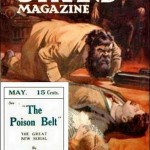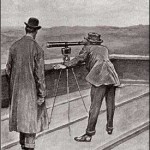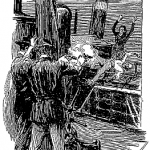“Oh, indeed,” said Kate, and turned with some common-place remark to Mrs. Wilkinson. Her heart was sore nevertheless, and she derived little pleasure from the remainder of the performance. As to Ezra, in spite of his great love for music, he dozed peacefully in a corner of the box during the whole of the last act. None of them were sorry when Faust was duly consigned to the nether regions and Marguerite was apotheosed upon a couple of wooden clouds. Ezra narrated the incident of the recognition in the stalls to his father on his return, and the old gentleman rubbed his hands over it.
“Most fortunate!” he exclaimed gleefully. “By working on that idea we might produce great effects. Who was the girl, do you know?”
“Some poor relation, I believe, whom he trots out at times.”
“We will find out her name and all about her. Capital, capital!” cried John Girdlestone; and the two worthies departed to their rooms much pleased at this new card which chance had put into their hands.
During the weary weeks while Tom Dimsdale, in accordance with his promise, avoided Eccleston Square and everything which could remind Kate of his existence, Ezra continued to leave no stone unturned in his endeavours to steal his way into her affections. Poor Tom’s sole comfort was the recollection of that last passionate letter which he had written in the Blackwall public-house, and which had, as he imagined, enlightened her as to the reasons of his absence, and had prevented her from feeling any uneasiness or surprise. Had he known the fate that had befallen that epistle, he would hardly have been able to continue his office duties so patiently or to wait with so much resignation for Mr. Girdlestone’s sanction to his engagement.
As the days passed and still brought no news, Kate’s face grew paler and her heart more weary and desponding. That the young man was well was beyond dispute, since she had seen him with her own eyes at the opera. What explanation could there be, then, for his conduct? Was it possible that he had told Mr. Girdlestone of their engagement, and that her guardian had found some means of dissuading him from continuing his suit—found some appeal to his interest, perhaps, which was too strong for his love. All that she knew of Tom’s nature contradicted such a supposition. Again, if Girdlestone had learned anything of their engagement, surely he would have reproached her with it. His manner of late had been kinder rather than harsher. On the other hand, could it have chanced that Tom had met this lady of the opera, and that her charms had proved too much for his constancy? When she thought of the honest grey eyes which had looked down into hers at that last meeting in the garden, she found it hard to imagine the possibility of such things, and yet there was a fact which had to be explained. The more she thought of it the more incomprehensible it grew, but still the pale face grew paler and the sad heart more heavy.
Soon, however, her doubts and fears began to resolve themselves into something more substantial than vague conjecture. The conversation of the Girdlestones used to turn upon their business colleague, and always in the same strain. There were stray remarks about his doings; hints from the father and laughter from the son. “Not much work to be got out of him now,” the old man would say. “When a man’s in love he’s not over fond of a ledger.”
“A nice-looking girl, too,” said Ezra, in answer to some such remark. “I thought something would come of it. We saw them together at the opera, didn’t we, Kate?”
So they would gossip together, and every word a stab to the poor girl. She strove to conceal her feelings, and, indeed, her anger and her pride were stronger even than her grief, for she felt that she had been cruelly used. One day she found Girdlestone alone and unbosomed herself to him.
“Is it really true,” she asked, with a quick pant and a catch of her breath, “that Mr. Dimsdale is engaged to be married?”
“I believe so, my dear,” her guardian answered. “It is commonly reported so. When a young lady and gentleman correspond it is usually a sign of something of the sort.”
“Oh, they correspond?”
“Yes, they certainly correspond. Her letters are sent to him at the office. I don’t know that I altogether like that arrangement. It looks as if he were deceiving his parents.” All this was an unmitigated lie, but Girdlestone had gone too far now to stick at trifles.
“Who is the lady?” asked Kate, with a calm set face but a quivering lip.
“A cousin of his. Miss Ossary is her name, I believe. I am not sorry, for it may be a sign that he has sown all his wild oats. Do you know at one time, Kate, I feared that he might take a fancy to you. He has a specious way with him, and I felt my responsibility in the matter.”
“You need not be afraid on that score,” Kate said bitterly. “I think I can gauge Mr. Dimsdale’s specious manner at its proper value.” With this valiant speech she marched off, head in air, to her room, and there wept as though her very heart would break.
John Girdlestone told his son of this scene as they walked home from Fenchurch Street that same day. “We must look sharp over it,” he said, “or that young fool may get impatient and upset our plans.”
“It’s not such an easy matter,” said his son gloomily. “I get along so far, but no further. It’s a more uphill job than I expected.”
“Why, you had a bad enough name among women,” the merchant said, with something approaching to a sneer. “I have been grieved times out of number by your looseness in that respect. I should have thought that you might have made your experience of some use now.”
“There are women and women,” his son remarked. “A girl like this takes as much managing as a skittish horse.”
“Once get her into harness, and I warrant you’ll keep her there quiet enough.”




